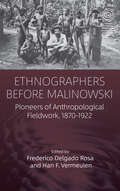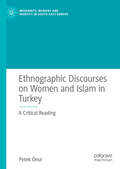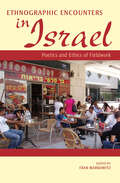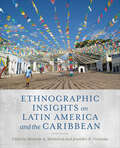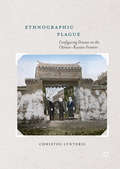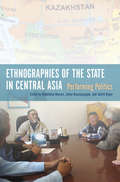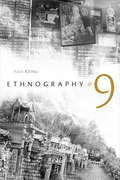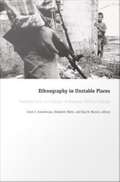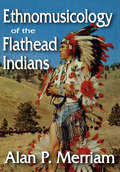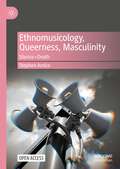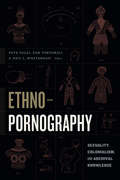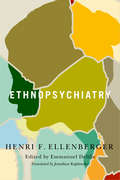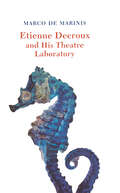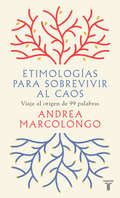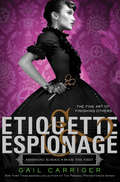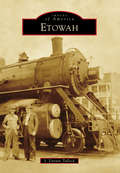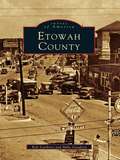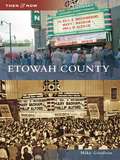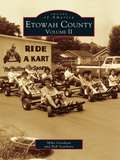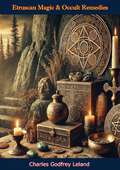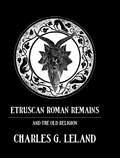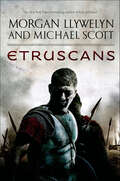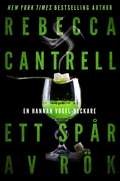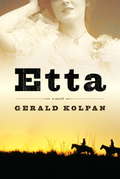- Table View
- List View
Ethnographers Before Malinowski: Pioneers of Anthropological Fieldwork, 1870-1922 (EASA Series #44)
by Frederico Delgado Rosa and Han F. VermeulenFocusing on some of the most important ethnographers in early anthropology, this volume explores twelve defining works in the foundational period from 1870 to 1922. It challenges the assumption that intensive fieldwork and monographs based on it emerged only in the twentieth century. What has been regarded as the age of armchair anthropologists was in reality an era of active ethnographic fieldworkers, including women practitioners and Indigenous experts. Their accounts have multiple layers of meaning, style, and content that deserve fresh reading. This reference work is a vital source for rewriting the history of anthropology.
Ethnographic Discourses on Women and Islam in Turkey: A Critical Reading (Modernity, Memory and Identity in South-East Europe)
by Petek OnurThis book provides a meta-reading of how ethnographic discourses on women and Islam in Turkey have changed since their emergence in 1983. It analyses the published ethnographic works in three discursive periods and shows that paradigm shifts in social sciences, processes of neo-liberal globalization and globalization of Islamism as well as political, social, cultural and economic transformations at the local level shape these periods. As an exceptional example of modernization in the Middle East and the post-imperial states in South-East Europe, Turkey has been experiencing tensions between Islamic beliefs and practices and Westernization and secularization processes. Countless aspects of Muslim women’s lives appear as symbols and indicators in this society like in many other Muslim majority societies and to scholars of gender and women’s studies in discussing the faith-based patriarchy. Thus, this book exhibits the necessity of developing a critical perspective on ethnographic representations of Muslim women in Turkey.
Ethnographic Encounters in Israel: Poetics And Ethics Of Fieldwork
by Fran MarkowitzIsrael is a place of paradoxes, a small country with a diverse population and complicated social terrain. Studying its culture and social life means confronting a multitude of ethical dilemmas and methodological challenges. The first-person accounts by anthropologists engage contradictions of religion, politics, identity, kinship, racialization, and globalization to reveal fascinating and often vexing dimensions of the Israeli experience. Caught up in pressing existential questions of war and peace, social justice, and national boundaries, the contributors explore the contours of Israeli society as insiders and outsiders, natives and strangers, as well as critics and friends.
Ethnographic Insights on Latin America and the Caribbean
by Melanie A. Medeiros Jennifer R. GuzmánEthnographic Insights on Latin America and the Caribbean offers a compelling introduction to the region by providing a series of ethnographic case studies that examine the most pressing issues communities are facing today. These case studies address key topics such as inequities during the COVID-19 pandemic, anti-Black racism, resistance against extractive industries, migration and transnational families, revitalization of Indigenous languages, art and solidarity in the wake of political violence, resilience in the face of climate change, and recent social movements. Designed for courses in a variety of disciplines, this expansive volume is organized in thematic sections, with introductions that draw important connections between chapters. The first section provides essential background on ethnography, archaeology, and history, while chapters in the following sections center local perspectives, strategies, and voices. Each chapter ends with reflection and discussion questions, key concepts with definitions, and resources to explore further. Presenting a snapshot of life during the early decades of the twenty-first century, Ethnographic Insights on Latin America and the Caribbean illuminates the structural forces and human agency that are determining the future of the region and the world.
Ethnographic Plague
by Christos LynterisChallengingthe concept that since the discovery of the plague bacillus in 1894 the studyof the disease was dominated by bacteriology, Ethnographic Plague argues for the role of ethnography as a vitalcontributor to the configuration of plague at the turn of the nineteenthcentury. With a focus on research on the Chinese-Russian frontier, where aseries of pneumonic plague epidemics shook the Chinese, Russian and JapaneseEmpires, this book examines how native Mongols and Buryats came to beunderstood as holding a traditional knowledge of the disease. Exploring theforging and consequences of this alluring theory, this book seeks to understandmedical fascination with culture, so as to underline the limitations of theemployment of the latter as an explanatory category in the context ofinfectious disease epidemics, such as the recent SARS and Ebola outbreaks.
Ethnographies of the State in Central Asia
by Johan Rasanayagam Judith Beyer Madeleine ReevesWith fresh and provocative insights into the everyday reality of politics in post-Soviet Central Asia, this volume moves beyond commonplaces about strong and weak states to ask critical questions about how democracy, authority, and justice are understood in this important region. In conversation with current theories of state power, the contributions draw on extensive ethnographic research in settings that range from the local to the transnational, the mundane to the spectacular, to provide a unique perspective on how politics is performed in everyday life.
Ethnography #9
by Alan KlimaAs Alan Klima writes in Ethnography #9, &“there are other possible starting places than the earnest realism of anthropological discourse as a method of critical thought.&” In this experimental ethnography of capitalism, ghosts, and numbers in mid- and late-twentieth-century Thailand, Klima uses this provocation to deconstruct naive faith in the &“real&” and in the material in academic discourse that does not recognize that it is, itself, writing. Klima also twists the common narrative that increasing financial abstractions in economic culture are a kind of real horror story, entangling it with other modes of abstraction commonly seen as less &“real,&” such as spirit consultations, ghost stories, and haunted gambling. His unconventional, distinctive, and literary form of storytelling uses multiple voices, from ethnographic modes to a first-person narrative in which he channels Northern Thai ghostly tales and the story of a young Thai spirit. This genre alchemy creates strange yet compelling new relations between being and not being, presence and absence, fiction and nonfiction, fantasy and reality. In embracing the speculative as a writing form, Klima summons unorthodox possibilities for truth in contemporary anthropology.
Ethnography in Unstable Places: Everyday Lives in Contexts of Dramatic Political Change
by Carol J. Greenhouse Elizabeth Mertz Kay B. WarrenEthnography in Unstable Places is a collection of ethnographic accounts of everyday situations in places undergoing dramatic political transformation. Offering vivid case studies that range from the Middle East and Africa to Europe, Russia, and Southeast Asia, the contributing anthropologists narrate particular circumstances of social and political transformation--in contexts of colonialism, war and its aftermath, social movements, and post-Cold War climates--from the standpoints of ordinary people caught up in and having to cope with the collapse or reconfiguration of the states in which they live. Using grounded ethnographic detail to explore the challenges to the anthropological imagination that are posed by modern uncertainties, the contributors confront the ambiguities and paradoxes that exist across the spectrum of human cultures and geographies. The collection is framed by introductory and concluding chapters that highlight different dimensions of the book's interrelated themes--agency and ethnographic reflexivity, identity and ethics, and the inseparability of political economy and interpretivism. Ethnography in Unstable Places will interest students and specialists in social anthropology, sociology, political science, international relations, and cultural studies. Contributors. Eve Darian-Smith, Howard J. De Nike, Elizabeth Faier, James M. Freeman, Robert T. Gordon, Carol J. Greenhouse, Nguyen Dinh Huu, Carroll McC. Lewin, Elizabeth Mertz, Philip C. Parnell, Nancy Ries, Judy Rosenthal, Kay B. Warren, Stacia E. Zabusky
Ethnomusicology of the Flathead Indians
by Alan MerriamAll people, in no matter what culture, must be able to place their music firmly in the context of the totality of their beliefs, experiences, and activities, for without such ties, music cannot exist. This means that there must be a body of theory connected with any music system - not necessarily a theory of the structure of music sound, although that may be present as well, but rather a theory of what music is, what it does, and how it is coordinated with the total environment, both natural and cultural, in which human beings move.The Flathead Indians of Western Montana (just over 26,000 in number as of the 2000 census) inhabit a reservation consisting of 632,516 acres of land in the Jocko and Flathead Valleys and the Camas Prairie country, which lie roughly between Evaro and Kalispell, Montana. The reservation is bounded on the east by the Mission Range, on the west by the Cabinet National Forest, on the south by the Lolo National Forest, and on the north by an arbitrary line, approximately bisecting Flathead Lake about twenty-four miles south of Kalispell. The area is one of the richest agricultural regions in Montana, and fish and game are abundant. The Flathead are engaged in stocking, timbering, and various agricultural enterprises.For the Flathead, the most important single fact about music and its relationship to the total world is its origin in the supernatural sphere. All true and proper songs, particularly in the past, owe their origin to a variety of contacts experienced by humans with beings which, though a part of this world, are superhuman and the source of both individual and tribal powers and skills. Thus a sharp distinction is drawn by the Flathead between what they call "make-up" and all other songs. Merriam's pioneering work in the relationship of ethnography and musicology remains a primary source in this field in anthropology.
Ethnomusicology, Queerness, Masculinity: Silence=Death
by Stephen AmicoThis open access book explores the disciplinary, disciplined, and recent interdisciplinary sites and productions of ethnomusicology and queerness, arguing that both academic realms are founded upon a destructive masculinity—indissolubly linked to coloniality and epistemic hegemony—and marked by a monologic, ethnocentric silencing of embodied, same-sex desire. Ethnomusicology’s fetishization of masculinizing fieldwork; queerness’s functioning as Anglophone master category; and both domains’ devaluation of sensuality and experience, concomitant with an adherence to provincial, Western conceptions of knowledge production, are revealed as precluding the possibilities for equitable, dialogic pluriversality. Enlisting the sonic as theoretical intervention, the disciplined/disciplining ethno and queer are reimagined in relation to negative emotions and intractable affect, ultimately vanquished, and replaced by explorations of sound, sex/uality, and experiential somaticity within a protean, postdisciplinary space of material/epistemic equity. This uncompromising, long-overdue critique will be of interest to researchers and students from numerous theoretical backgrounds, including music, sound, gender, queer, and postcolonial/decolonial studies.
Ethnopornography: Sexuality, Colonialism, and Archival Knowledge
by Neil L. Whitehead Pete Sigal Zeb TortoriciThis volume's contributors explore the links among sexuality, ethnography, race, and colonial rule through an examination of ethnopornography—the eroticized observation of the Other for supposedly scientific or academic purposes. With topics that span the sixteenth century to the present in Latin America, the United States, Australia, the Middle East, and West Africa, the contributors show how ethnopornography is fundamental to the creation of race and colonialism as well as archival and ethnographic knowledge. Among other topics, they analyze eighteenth-century European travelogues, photography and the sexualization of African and African American women, representations of sodomy throughout the Ottoman empire, racialized representations in a Brazilian gay pornographic magazine, colonial desire in the 2007 pornographic film Gaytanamo, the relationship between sexual desire and ethnographic fieldwork in Africa and Australia, and Franciscan friars' voyeuristic accounts of indigenous people's “sinful” activities. Outlining how in the ethnopornographic encounter the reader or viewer imagines direct contact with the Other from a distance, the contributors trace ethnopornography's role in creating racial categories and its grounding in the relationship between colonialism and the erotic gaze. In so doing, they theorize ethnography as a form of pornography that is both motivated by the desire to render knowable the Other and invested with institutional power.Contributors. Joseph A. Boone, Pernille Ipsen, Sidra Lawrence, Beatrix McBride, Mireille Miller-Young, Bryan Pitts, Helen Pringle, Pete Sigal, Zeb Tortorici, Neil L. Whitehead
Ethnopsychiatry (McGill-Queen's/Associated Medical Services Studies in the History of Medicine, Health, and Society #56)
by Henri F. EllenbergerWhat is the relationship between culture and mental health? Is mental illness universal? Are symptoms of mental disorders different across social groups? In the late 1960s these questions gave rise to a groundbreaking series of articles written by the psychiatrist Henri Ellenberger, who would go on to publish The Discovery of the Unconscious: The History and Evolution of Dynamic Psychiatry in 1970. Fifty years later they are presented for the first time in English translation, introduced by historian of science Emmanuel Delille. Ethnopsychiatry explores one of the most controversial subjects in psychiatric research: the role of culture in mental health. In his articles Ellenberger addressed the complex clinical and theoretical problems of cultural specificity in mental illness, collective psychoses, differentiations within cultural groups, and biocultural interactions. He was especially attuned to the correlations between rapid cultural transformations in postwar society, urbanization, and the frequency of mental illness. Ellenberger drew from a vast and varied primary and secondary literature in several languages, as well as from his own findings in clinical practice, which included work with indigenous peoples. In analyzing Ellenberger's contributions Delille unveils the transnational and interdisciplinary origins of transcultural psychiatry, which grew out of knowledge networks that crisscrossed the globe. The book has a rich selection of appendices, including Ellenberger's lecture notes on a case of peyote addiction and his correspondence with anthropologist and psychoanalyst Georges Devereux. These original essays, and their masterful contextualization, provide a compelling introduction to the foundations of transcultural psychiatry and one of its most distinguished and prolific researchers.
Ethos, Logos, and Perspective: Studies in Late Byzantine Rhetoric (Routledge Research in Byzantine Studies)
by Florin LeonteEthos, Logos, and Perspective represents the first comprehensive study of late Byzantine court rhetorical praise as a general phenomenon surfacing in many types of rhetorical epideictic compositions dating from the fourteenth and the fifteenth centuries: panegyrics, encomia, city descriptions, encomiastic verses, or letters. The aim of this book is to reconstruct the two perspectives, idealism and pragmatism, that shaped authorial choices in matters of rhetorical style and composition. This study uncovers a little-known period in the history of Byzantine rhetoric. Proceeding from a nuanced understanding of the ancient concepts of ethos and logos, it analyzes the rhetoric of Byzantine praise in a modern theoretical framework. Unlike other previous studies of Byzantine rhetoric, the present research traces the structures and meanings that ultimately influenced the political attitudes and values circulating in the last century of Byzantine history. Another feature of this book is that it offers translations and discussions of important passages from the late Byzantine rhetoric, a corpus of texts that only recently has started to receive attention. This book will appeal to scholars, students, and all those interested in Byzantine literary culture (particularly in reference to moral and spiritual advice) and the techniques of Byzantine rhetoric. In addition, readers will also find informative approaches on the main authors and genres of late Byzantine rhetoric.
Etienne Decroux and his Theatre Laboratory (Routledge Icarus Ser.)
by Marco de MarinisEtienne Decroux and His Theatre Laboratory is based on the long-awaited translation of Marco De Marinis' monumental work on mime in the twentieth century: Mimo e teatro nel Novecento (1993). Now revised and updated, the volume focuses specifically on the seminal role played by French mime artist and pedagogue Etienne Decroux. Mime is a theatrical form of ancient tradition. In the nineteenth century, it saw both apogee and crisis in the west with the realistic and gesticulating 'white pantomime'. In the twentieth century, it underwent a radical overhaul, transforming into an 'abstract' corporeal art that shunned imitation and narrative, and which instead tended towards the plastic, elliptic, allusive, and symbolic transposition of actions and situations. This book is the result of detailed investigations, based on contemporary accounts and obscure or unpublished materials. Through the examination of the creative, pedagogical, and theoretical work of the 'inventor' of the new mime art, Etienne Decroux, De Marinis focuses on the different assumptions underlying the various modes of the problematic presence of mime in the theatre of the twentieth century: from the utopia of a 'pure' theatre, attributed to the sole essence of the actor, to its decline into a closed poetic genre often nostalgically stuck in the past; from mime as a pedagogical tool for the actor to mime as an expressive and virtuosic means in the hands of the director.
Etimologías para sobrevivir al caos: Viaje al origen de 99 palabras
by Andrea Marcolongo99 momentos de felicidad etimológica y amor al lenguaje. Las palabras dan forma a nuestra idea del mundo. Cuando elegimos un término con atención ponemos cierto orden en el caos, y esa es también una bonita manera de cuidarnos. Un discurso pobre, impreciso, insípido y sin relieves refleja un pensamiento equivalente. ¿Cómo escapar del desconcierto de la indefinición? ¿Cómo recuperar el sentido de las cosas? Andrea Marcolongo dibuja un atlas etimológico lleno de sorpresas que nos lleva a los orígenes de nuestra historia, revela quiénes hemos sido y nos invita a pensar quiénes queremos ser. Explorar las raíces de los términos, saborear sus matices, asombrarse ante los desplazamientos que han sufrido a través de los siglos y los lugares equivale a trazar la evolución de nuestra lectura del mundo. El arte de reconstruir las etimologías es, por tanto, cualquier cosa menos estéril: es un fin en sí mismo. ¿Desde qué lugar lejano ha viajado cada palabra antes de llegar a nosotros? ¿Qué otros paisajes ha recorrido, influyendo en otros idiomas y moldeándose a su vez? Quizá no haya mejor lección sobre nuestra esencia que la que ofrecen estas viajeras cuya supervivencia depende de la evolución, la mezcla y el movimiento. La crítica ha dicho:«Marcolongo regresa a su punto fuerte, el instinto de la palabra, la búsqueda de las raíces. Es una mente creativa en constante movimiento.»Grazia «Un viaje al aire fresco de las palabras precisas. Y un acto de amor a los seres humanos, que siempre se han reflejado en ellas.»Il Foglio «La autora juega con las palabras como una niña con Lego. Con ligereza, sin obstáculos.»Libero «Se entremezclan los comentarios sabios y las intuiciones íntimas entre destellos sutiles.»Le Monde «La joven helenista publica un viaje lleno de sorpresas a través de un centenar de palabras, guiado por su búsqueda de la autenticidad.»Libération «Marcolongo se salva a sí misma y nos salva recogiendo el néctar de las raíces de las palabras, etimología de la pasión.»France Inter «Una maravillosa búsqueda de los orígenes.»Le Figaro Magazine «Una narradora excepcional, con un estilo claro y refrescante.»Les Échos «Un atlas etimológico entrañable.»Le Figaro «Entre otras cosas descubrirás lo que realmente significa "leer", "traicionar", "globo aerostático", "beso" y "mariposa". Parecen muchas, pero, en realidad, cuando llegues a la última página, te parecerán muy pocas.»Il Foglio
Etiquette & Espionage: Booktrack Edition (Finishing School #1)
by Gail CarrigerIt's one thing to learn to curtsy properly. It's quite another to learn to curtsy and throw a knife at the same time. Welcome to Finishing School.Fourteen-year-old Sophronia is a great trial to her poor mother. Sophronia is more interested in dismantling clocks and climbing trees than proper manners--and the family can only hope that company never sees her atrocious curtsy. Mrs. Temminnick is desperate for her daughter to become a proper lady. So she enrolls Sophronia in Mademoiselle Geraldine's Finishing Academy for Young Ladies of Quality. But Sophronia soon realizes the school is not quite what her mother might have hoped. At Mademoiselle Geraldine's, young ladies learn to finish...everything. Certainly, they learn the fine arts of dance, dress, and etiquette, but the also learn to deal out death, diversion, and espionage--in the politest possible ways, of course. Sophronia and her friends are in for a rousing first year's education. Set in the same world as the Parasol Protectorate, this YA series debut is filled with all the saucy adventure and droll humor Gail's legions of fans have come to adore.
Etowah (Images of America)
by S. Durant TullockIn 1902, the Louisville and Nashville Railroad was looking for a place halfway between Cincinnati and Atlanta to build a rail center. This site would be the home of a rail yard for crew changes and shops to build and repair boxcars. After being turned down for two locations, the railroad looked to an area at the foot of Starr Mountain rich with timber to build the shops and railcars. Several years later, a decision was made to go forward with this site, and in 1906 the L&N Railroad built its first planned community. In one year, over 2,000 people were employed by the line, and a town emerged. One hundred years later, the town maintains a rich heritage built around the rail.
Etowah County
by Bob Scarboro Mike GoodsonDrawing from, among other sources, the collection of famed photographer Adolph Lebourg, a French immigrant who traveled to Alabama with a circus, Scarboro and Goodson combine wonderful images with insightful text to provide a unique look at the county's heritage. Especially evident in Lebourg's photographs is a passion for motorcycles, providing a great point of interest for many of the book's images. Etowah County includes such points of interest as the Kyle Home, which once stood on the present site of the Etowah County Courthouse, the home of Alabama Power Company founder W.P. Lay, andseveral of the county's early movie theaters. Many local businesses and industries are highlighted in the early years of their existence. Also included are glimpses of such local events as parades, sporting events, and the beautiful Nocallula Falls. Whether one is a longtime resident familiar with all the area has to offer, or a newcomer eager to learn more of the county's heritage, Etowah County is a wonderful look at days gone by.
Etowah County
by Mike GoodsonEtowah County, located in northeast Alabama, was formed in 1866 from parts of Marshall, Calhoun, St. Clair, DeKalb, Blount, and Cherokee Counties. Originally known as Baine, the area was named Etowah County in 1868. Although the smallest county in Alabama in land area, Etowah is rich in local history.
Etowah County Volume II
by Bob Scarboro Mike GoodsonEtowah County Volume II traces the history of everyday citizens in this Alabama community. Largely derived from the collections of local photographers Bob Scarboro and Hugh Hall, the images in this volume depict the county's championship sports teams, the drive-in theaters and restaurants of the post-World War II era, and the mansions that once lined Forrest Avenue. Also included are two rare and seldom-seen photographs-the old dummy engine of the streetcar line that ran from Gadsden to Attalla, and the wooden dance pavilion located beneath Noccalula Falls at the turn of the century. Readers will discover the lasting contributions made to Etowah County by such notable early settlers as Col. R.B. Kyle, Capt. James M. Elliott Jr., Gen. Daniel Turrentine, and Judge John H. Disque. Many of the area's schools, businesses, and churches can be attributed to the efforts of these enterprising individuals. Etowah County Volume II also celebrates the contributions made by the hard-working, everyday people who have made this Alabama community a memorable place to live.
Etruscan Magic & Occult Remedies
by Charles Godfrey LelandCharles Godfrey Leland’s "Etruscan Magic & Occult Remedies" is a captivating journey into the mystical and magical practices of the ancient Etruscans, a civilization that predates and profoundly influenced the Romans. Drawing on extensive research and firsthand accounts, Leland offers a comprehensive exploration of Etruscan magic, folklore, and healing practices, unveiling the rich spiritual heritage of this enigmatic people.Leland, an esteemed folklorist and author, presents a detailed and engaging study of the Etruscan belief system, highlighting its unique blend of magic, religion, and practical remedies. This book is an invaluable resource for historians, occult enthusiasts, and anyone interested in ancient cultures and their esoteric traditions.Key themes include:Etruscan Deities and Spirits: Leland delves into the pantheon of Etruscan gods and goddesses, exploring their attributes, stories, and significance in Etruscan spirituality. He also examines the roles of various spirits and their influence on daily life and magical practices.Magical Practices and Rituals: The book provides a detailed account of the Etruscan magical rites, including spells, incantations, and ceremonial practices. Leland explains the symbolic meanings and practical applications of these rituals, offering readers insights into the Etruscan worldview.Occult Remedies and Healing: Leland explores the Etruscan approach to health and healing, detailing the use of herbs, charms, and other natural remedies. He highlights the holistic nature of Etruscan medicine, which integrates spiritual and physical well-being.Divination and Prophecy: The Etruscans were renowned for their divinatory practices, particularly through the reading of animal entrails (haruspicy) and lightning (augury). Leland provides an in-depth look at these methods and their significance in Etruscan culture."Etruscan Magic & Occult Remedies" is a fascinating and scholarly work that brings to light the mystical traditions of a little-known but highly influential civilization. Charles Godfrey Leland’s thorough research and engaging narrative make this book a must-read for anyone interested in the mysteries of the ancient world.
Etruscan Roman Remains
by LelandCast a spell against gossips, deflect unwanted romantic attention, or bring the dead back to life. The renowned 19th-century folklorist and expert on witchy cultures Charles Leland believed he had uncovered the secrets of practical domestic magic as the ancient pagans of Italian Tuscany performed it, and he shared all in this classic 1892 study. Considered by the author to be his own masterwork, this enthralling work--one still the subject of heated debate among modern pagans, some of whom embrace it while others deny its accuracy--here are detailed examinations of the "gods and goblins" of the region as well as the time-honored incantations, divinations, medicines, and amulets of the Tuscans.
Etruscans: Beloved Of The Gods
by Morgan Llywelyn Michael ScottIn the early days of the Roman Empire, the noble Etruscan civilization in Italy is waning, Vesi, a young Etruscan noblewoman, is violated by a renegade supernatural being. Outcast then from Etruria, Vesi bears Horatrim, a child who carries inexplicable knowledge and grows to manhood in only six years. But a savage Roman attack leaves Vesi unresponsive and Horatrim homeless and vulnerable, and he travels to Rome where his talents confound powerful businessman Propertius, who arranges to adopt Horatrim as a son, changing his name to Horatius. And all the while his demon father is seeking him to kill him, for Horatius is a conduit through which the demon might be found and destroyed.At the Publisher's request, this title is being sold without Digital Rights Management Software (DRM) applied.
Ett spår av rök
by Rebecca Cantrell Cecilia PalmcrantzEn prisbelönt roman om en kriminalreporter som letar efter sin brors mördare på Berlins nattklubbar och bakgator. Berlin 1931. Året då Tyskland förlorades till nazisterna. Stormtrupper och kommunister slåss på gatorna. Förmögna judar och intellektuella planerar sin flykt från staden. Desperata, sexuellt och socialt utstötta människor trängs på Berlins berömda nattklubbar för att få dansa en sista dans. Hannah Vogel lever ensam och jobbar som kriminalreporter. Under ett rutinuppdrag får hon syn på ett fotografi av sin döde brors kropp i Dödshallen på Alexanderplatz polisstation. Men eftersom hon har lånat ut sina identitetshandlingar till judiska vänner på flykt från Tyskland, kan hon inte identifiera honom och kräva en utredning. Istället tar hon själv upp jakten på mördaren.
Etta: A Novel
by Gerald KolpanBeautiful, elusive, and refined, Etta Place captivated the nation at the turn of the last century as she dodged the law with the Wild Bunch, led by Butch Cassidy and the Sundance Kid. Her true identity and fate have remained a mystery that has tantalized historians for decades. Now, for the first time, Gerald Kolpan envisions this remarkable woman’s life in a stunning debut novel.Kolpan imagines that Etta Place was born Lorinda Jameson, the daughter of a prominent financier, who becomes known as the loveliest of the city’s debutantes when she makes her entrance into Philadelphia society. Though her position in life is already assured, her true calling is on horseback. She can ride as well as any man and handle a rifle even better. But when a tragedy leads to a dramatic reversal of fortune, Lorinda is left orphaned, penniless, homeless, and pursued by the ruthless Black Hand mafia.Rechristened “Etta Place” to ensure her safety, the young woman travels to the farthest reaches of civilization, working as a “Harvey Girl” waitress in Grand Junction, Colorado. There, fate intervenes once more and she again finds herself on the run from the ruthless Pinkerton Detective Agency. But this time she has company. She soon finds herself at the legendary hideout at Hole-in-the-Wall, Wyoming, where she meets the charismatic Butch Cassidy and the handsome, troubled Harry Longbaugh, a.k.a. the Sundance Kid. Through a series of holdups and heists, Etta and Harry begin an epic and ultimately tragic romance, which will be the greatest of Etta’s life. Then, when Etta meets the young and idealistic Eleanor Roosevelt, her life is changed forever.Blending a compelling love story, high adventure, and thrilling historical drama, Etta is an electrifying novel. With a sweeping 1900s setting, colorful storytelling, and larger-than-life characters, Etta is debut that is both captivating and unforgettable.From the Hardcover edition.
